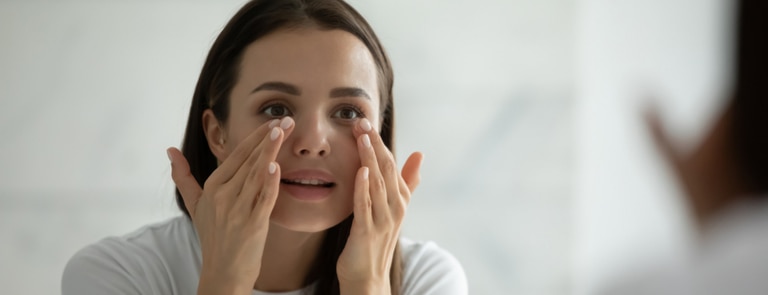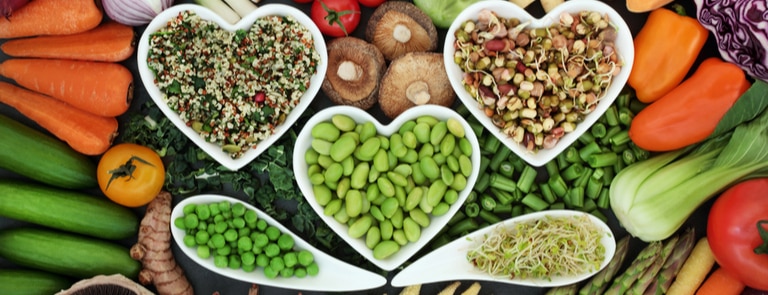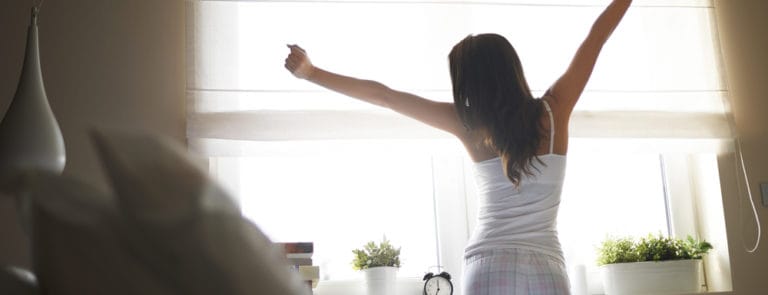10% off £35
The importance of sleep
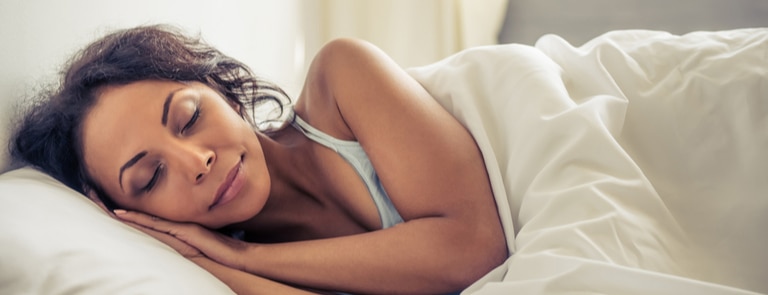
There’s sleep. And then there’s deep sleep.
This article is going to mainly focus on the latter, starting with the most logical place – an introduction to what sleep is and why we all need it.
Why do we need sleep?
We need sleep for a number of reasons.
Number one, to help us consolidate our memories, which is a process in which our experiences are mentally transferred from our short-term to our long-term memory.
Number two, we need sleep to recharge our brain and our bodies.
Sleep is particularly crucial for growing children, who need it to help power their overall development, e.g. their language, social and motor skills and physical development. It’s one of the reasons why children need more sleep than adults.1
So while sleep is an act of resting, it doesn't mean the body is not working. Sleep is a time when there is a lot going on!
How much sleep do we need?
The amount of sleep differs according to our age. According to guidance published by the NHS, most adults need between 6 to 9 hours of sleep every night.2
Meanwhile, children need anything from between 16.5 hours a day (1 week old baby) to 9 hours a night (16-year-old).3
But what does this look like in reality? Only you can know how much sleep you need, and everyone's needs are different.
If more often than not, you feel refreshed upon waking and can get through your day without feeling disadvantaged from your night's sleep, then you probably don’t need to fret.
It's also normal to not sleep well all of the time, so don't worry if you occasionally get a bad night's sleep.
Also, while they are not in the majority, there are naturally short and long sleepers out there who don’t fit into these very rigid guidelines.
What is sleep?
It’s when neurotransmitters, the nerve-signalling chemicals in our bodies, stop producing serotonin and norepinephrine, which keeps our brain active and awake.
Instead, these neurons switch off. At the same time, a chemical known as adenosine, builds up in our blood, causing drowsiness.4
There are four different stages of sleep:5
- Stage 1: Light sleep – the phase between being awake and falling asleep.
- Stage 2: The onset of sleep – body temperature drops.
You may have experienced ‘hypnic jerks’ where you jump awake, or dream of falling off a curb or out of a plane…quite startling!
This is quite normal. It can sometimes happen when our body and mind are winding down at different rates.
If you find the frequency of hypnic jerks increasing beyond what is normal for you, working on the quality of your ‘you time’ before bed and making sure you have a consistent sleep pattern can help to reduce them.
- Stage 3: Deepest and most restorative sleep takes place (more on this below).
Note: It is known as the ‘healing phase’ because it’s when tissue growth and repair takes place, hormones are released and energy’s restored.6 It is the most difficult to rouse someone from this state.
- Stage 4 (REM): Takes place around 90 minutes after falling asleep and again every 90 minutes, getting longer later in the night.
Often REM is referred to as ‘dream’ sleep. It is true that some of the more graphic detailed dreams happen here, but we do actually dream in other areas of sleep too.
Often remembering our dreams is a sign of REM disruption. We all dream regardless of whether we remember or not.
REM is a very sensitive area of sleep, meaning it's quite easy for it to be disrupted - something that is more common as we get older.
What happens during deep sleep?
The middle stage of sleep (stage 3) is when we experience deep sleep, which is also known as slow-wave sleep or delta sleep.7
When we deep sleep our:
- Heartbeat, breathing and brainwaves slow down
- Muscles relax
In turn, deep sleep can help: our brain process and store away memories, let our minds switch off, regulate our hormones, boost our immune system, keep our blood sugar down and make us feel more energised for the day ahead.8
If you’re truly in a deep sleep, then you won’t wake up to loud noises. A bit like REM, deep sleep happens in regular phases. The first can last between 45 and 90 minutes and for longer as the night goes on.9
We have a higher percentage of deep sleep in the first half of the night, and a higher percentage of REM sleep in the second half of the night.
That means sleeping after midnight is just as important as sleeping before midnight, contrary to the old wives tale!
How much deep sleep do I need?
It is estimated healthy adults get around 13 to 23% deep sleep a night, which equates to around 62 to 110 minutes for every eight hours of slumber.
So that means that overall, you are probably getting less than 2 hours of deep sleep every night.
As for babies and children, 50% of their sleep is divided between stages 1 to 4.10
How do I know if I’m getting enough sleep?
It’s best to focus on building consistently timed good quality sleeps instead of worrying about whether you're getting enough.
Your body will tell you if you aren’t getting your quota of sleep by giving off one of more of these signs, as well as many other signs:
-
Brain fog
Brain fog is when your brain feels a bit foggy and not 100% focused on what you’re doing, which can lead to you doing absent-minded things, such as putting your phone in the fridge or spraying deodorant on your hair instead of hairspray…
-
Trouble staying awake
If you’re nodding off on your train journey to work, or struggling to keep your eyes open at your desk, chances are you need more sleep.
-
Gaining weight
Leptin is a hormone that’s responsible for telling us we feel full. But when we’re tired, these levels drop and means we can constantly feel hungry.
-
Feeling irritated
When sleep-related, this is mainly caused by the fact you don’t feel energised or have the concentration to deal with things like you usually would.
-
Hardly exercising
You may find yourself avoiding exercise because you’re too tired to do it and aren’t going to the gym at all, or are getting there and are feeling too shattered to do anything.11
How can lack of quality sleep affect my well-being?
When you’re asleep, your brain is getting prepped for the day ahead, assisting with ways to learn, remember information, and interact.
If you’re experiencing poor sleep, it can potentially alter how certain parts of your brain operate.
However, it’s impossible to have the perfect sleep every night, and the odd poor night - even if it makes you feel less good than usual - isn’t going to do any real harm.
Worrying and fearing what will happen if your poor sleep continues leads to changes in our behaviour that often don’t improve sleep, and can actually lead to insomnia – broken, poor quality sleep over much longer periods of time.
It’s not great because it makes us feel out of control and lonely, and can have detrimental impacts on our mental health.
It is true that if you could get the perfect night's sleep every night, your performance in life could be the best it can be.
But in order to maintain that kind of sleep, you would have to sacrifice a lot of life's experiences, such as having a social life etc.
It’s a bit like ‘clean eating’. We know that eating perfectly every day would be very good for our bodies, but history dictates that it also causes serious eating disorders and mental health problems too.
It is better to see being healthy as a balance, and this goes for your sleep too.
Looking after your sleep, in general, is very good for you - making sure the ratio between really good sleep and not so good sleep, is always tipped in your favour. Much like a healthy balanced diet, where you can be flexible and have foods that you enjoy once in a while!
But becoming too obsessive about every single night will actually not improve your sleep.
How can sleep affect your weight?
The link between sleep and weight
Most people think that calories are the be all and end all of weight loss. But the body is not a machine. It’s a lot more complex than that. Sleep can have a remarkable effect on your weight loss, food choices, cravings, and even on the hormones which govern fat loss.
How poor sleep can make weight loss more difficult
Ever noticed how you crave stodgy comfort food after a broken night’s sleep? That’s your body’s way of asking for more energy. But when you’re tired, it’s difficult to untangle the body’s requests for more sleep and more calories.
When you haven’t had enough sleep, key hormones are affected (including grehlin and leptin) which impact fat loss, hunger, and feeling full after eating. Lack of good quality sleep attacks your weight loss efforts from all angles: hormonal, behavioural, mood, and energy.
Sleep well to lose weight
If you can make a few changes to your sleep routine, it will pay off.
You will feel more energised and keen to exercise tomorrow. Your food cravings will vanish, and you’ll make healthier snack choices.
And your body will actually be more willing to burn body fat.
7 sleep myths: busted
Here are the seven biggest sleep myths busted.
MYTH: You can "cheat" sleep debt
FACT: Let’s face it, our busy lives mean we all burn the candle at both ends during the week.
By the weekend, “sleep debt” creeps up on us like nobody’s business.
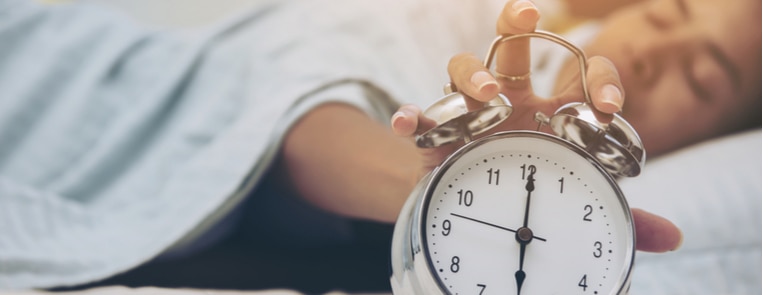

Unfortunately, it’s not simply a case of catching up on lost zzzzs at the weekend.
The brain is very intelligent. It can actually increase the areas of sleep it feels you need more of during its next sleep opportunity, rather than increasing the overall duration of sleep.
What that means is by changing our behaviour to allow for more sleep by lying in, going to bed earlier or even catnapping, we are actually reinforcing a new pattern to the brain by moving away from our normal sleep/wake cycles.
The easiest and most effective way to avoid sleep debt is to aim to wake up at a consistent time every day.
MYTH: Insomnia is simply difficulty dropping off
FACT: Some people with insomnia have no difficulty dropping off to sleep, but then struggle to stay asleep in the night.
They might wake up and are unable to get back to sleep or they drift in and out of sleep.
Others may just wake up far too early, and then some people might just feel the quality was really, really poor, despite not being able to define it as clearly.
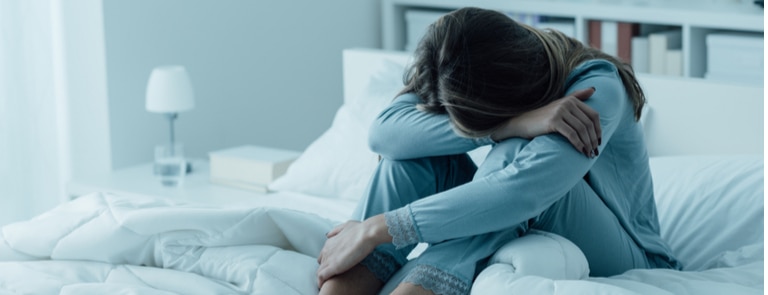

Insomnia often presents itself quite differently from person to person, but the common denominators can be seen in its frequency (it often happens more days of the week than it doesn't).
For it to be described as chronic insomnia, it will have been happening for 3 months or more. Sometimes it happens a bit more ambiguously than that, such as in cycles at different times of the year.
Up to half of adults suffer from insomnia, and women are three times more likely to than men.
MYTH: Alcohol helps you zzzzzz better
FACT: Some people use alcohol to help when they can’t sleep.
However, while you may feel a good glug calms you and helps you drop off, it actually boosts the number of times you wake during the night.
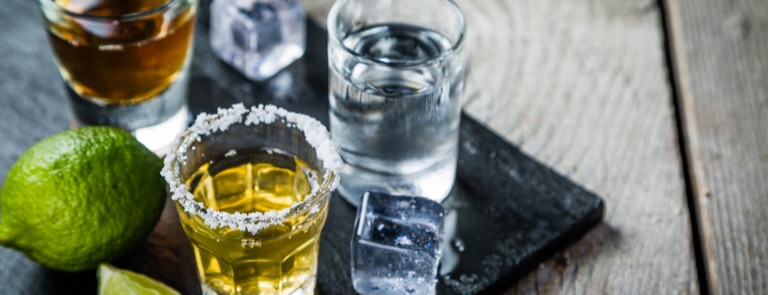

You’ll also spend less time in restorative deep sleep and more in the less restful REM stage so the benefits are lessened.
Essentially, alcohol will help you feel dozy in the first instance, but once your metabolism has burned it off, you get a ‘wake rebound’ so it actually makes the rest of your night’s sleep worse!
Also, bear in mind that the more you use alcohol, the more you need in order to maintain the initial effects.
That means that using it for sleep can increase your chances of alcoholism.
MYTH: Eating turkey makes you sleepy
FACT: We’ve all been victim of the post-Christmas lunch slump on December 25th, but is turkey to blame?
It’s commonly believed the sleepy chemical tryptophan in turkey has the effect of sending us to sleep.
However, turkey contains no more tryptophan than other meats.
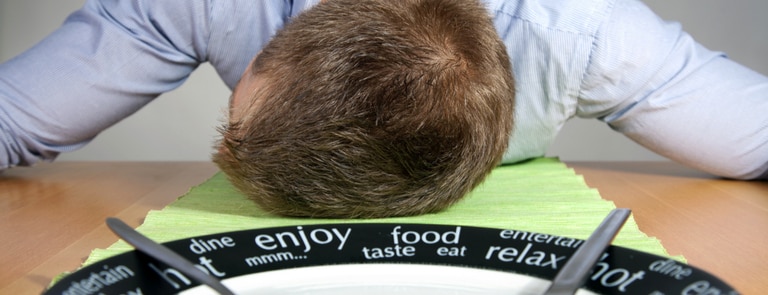

It’s much more likely that the large meal, OTT drinking and dip in our body’s natural circadian rhythms combine to send us into the land of nod for a brief period of time.
Even consuming higher levels of tryptophan cannot cure chronic sleep problems.
It's best to stick to more influential ways of keeping your sleep on track, such as regulating our own behaviour.
MYTH: Snoozing less keeps you thin
FACT: Most people think the more time you’re awake, the more active you’ll be, burning up calories and staying slimmer. Makes sense, right?
Surprisingly, studies show cutting back on good quality sleep can actually have the opposite effect, increasing your chance of gaining weight.
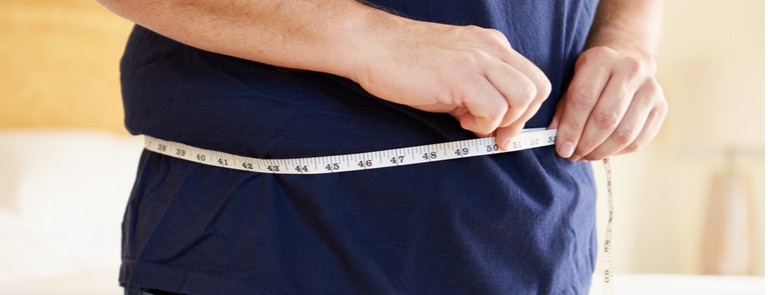

Being tired reduces natural appetite-suppressants, and boosts a hormone called ghrelin, which triggers hunger.
Poor sleep also results in lower levels of the hormone leptin, kickstarting a starvation-like response in the body.
Brain imaging has also shown that tired individuals are much more likely to make poor food choices generally. Ditch the diet for the duvet? The stuff that dreams are made of.
In order to help you body regulate appetite hormones, maintain a consistent wake-up time on weekdays and weekends.
If the time you ‘start’ in the mornings does not change too much, it helps your brain habitually regulate certain physiological processes such as appetite regulation.
That’s because your sleep/wake cycle and appetite regulations are all part of your circadian rhythm.
MYTH: Never wake a sleepwalker
FACT: Sleepwalking affects around 20 per cent of children, and it usually runs in the family, (although most adults grow out of it – phew!).


Sleepwalkers have been known to do wild things including eat strange objects, go for a drive, swim in lakes and in the most extreme cases, even commit crimes.
Thankfully, sleepwalking’s usually just a dozy stroll. It’s said if you wake a sleepwalker, you could shock them into a heart attack, but there’s no proof of this.
Waking them isn’t advised as it may distress them and even cause them to accidentally lash out.
If their safety’s at risk, try gently encouraging them back to the bedroom if you can, or creating a loud enough noise from afar to wake them.
Tying a bell to the sleepwalker’s bedroom door will also alert you that they’re on the move, so you can help get them back to bed sooner.
Sleepwalking can be reduced by looking after your sleep and regulating your sleep-wake cycle. It is often exacerbated by poor sleeping patterns, stress and drugs (alcohol, caffine, medications, etc).
MYTH: Snoring is harmless
FACT: Whilst snoring is quite common (affecting around 20% of the population), it can sometimes be a sign of a bigger problem.
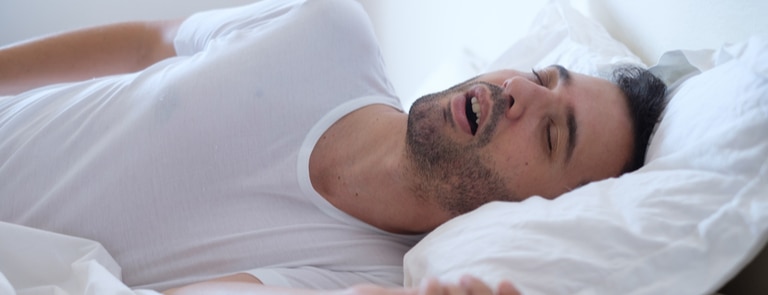

Watch out for other factors, such as someone witnessing you stopping breathing or gasping at night, significant sleepiness during the day, frequent trips to the loo or headaches in the morning.
This could be a sign of sleep apnea and should be checked with your GP.
Sleep apnea is a condition where people stop breathing – sometimes hundreds of times – during the night, which not only can affect your heart health but also how sleepy you feel during the day.
This can even be dangerous if you drive.
If you have a snoring issue with these factors, check with a doctor that it’s not serious.
There are some techniques that may help improve snoring. You could try to change your sleeping position so you’re lying on your side, avoid alcohol before bedtime and drink plenty of water.
Sometimes snoring and other issues can be related to weight gain. Try losing a few pounds (which will reduce the amount of weight around your neck area) to see if you can alleviate your symptoms that way.
How to get better quality sleep
-
Have a bedtime schedule
As already mentioned, getting up at the same time each day can do wonders for your sleep quality.
-
Don’t go to bed until you're sleepy tired
Forcing yourself to bed without sleepiness is about as useful as a chocolate teapot – you will only exacerbate repetitive thinking and anxiety.
-
Eat a balanced diet
Eat a balanced diet that is fairly consistent in quality and timing each day.
The more your brain understands when to eat and what it’s getting, the more it can understand other times are for sleep.
-
Be mindful of your caffeine intake
Only drink caffeine during the first half of the day.
Our sensitivities to it are all different, but in general,caffeine isn’t that helpful to your body's ability to wind down.
-
Exercise during the day
Some people find exercising too late at night can affect how quickly they fall asleep.
However, this isn’t everyone, and exercise, in general, is fantastic for your sleep.
-
Find time to wind down
Make sure after all your chores and responsibilities are done for the day, you have an hour just for you.
That way, once you feel sleepy tired, you can just slip off to bed without having to do anything else (which often wakes us up!)
-
Reduce light levels
Make sure the last third of your day isn’t brightly lit.
Like a nice long sunset, we eventually want you to be in total darkness (bed), and having that gradient can be very helpful for your brain's internal sleepy quest.
-
Tidy your sleeping space
Make sure you have access to a clean, tidy, and peaceful room for sleeping.
Try and do not much else in that room (apart from sex, which is very good for sleep!)
The final say
Remember that it's completely normal to have good and bad sleep.
We just want the ratio to be more in your favour so that you feel your best self.
That doesn’t mean stopping doing all the things you love and living a ritualistic and regimented lifestyle all the time. It just means having balance and looking after yourself overall.
In fact, being social, getting outside and making sure you exercise and eat well so you feel satiated (even when we feel rubbish from having a bad nights sleep), is extremely important for our sleep.
All these things help to lift our mood and have good quality days - and good quality days lead to good quality nights!
Last updated: 3 November 2021
- https://www.sleepfoundation.org/articles/why-do-we-need-sleep
- https://www.nhs.uk/live-well/sleep-and-tiredness/how-to-get-to-sleep/
- https://www.nhs.uk/live-well/sleep-and-tiredness/how-much-sleep-do-kids-need/
- https://www.sleepassociation.org/about-sleep/what-is-sleep/
- https://www.sleepfoundation.org/articles/what-happens-when-you-sleep
- https://www.healthline.com/health/how-much-deep-sleep-do-you-need
- https://www.healthline.com/health/deep-sleep#sleepstages
- https://greatist.com/health/how-much-deep-sleep-do-you-need#how-to-get-more-deep-sleep
- https://www.healthline.com/health/deep-sleep#sleepstages
- https://www.healthline.com/health/how-much-deep-sleep-do-you-need#sleep-deprivation
- https://mantasleep.com/blogs/sleep/8-clear-signs-you-re-not-sleeping-deeply-enough
- https://www.healthline.com/health/deep-sleep#tips
- https://www.bupa.co.uk/newsroom/ourviews/nine-benefits-good-night-sleep
- https://www.bupa.co.uk/newsroom/ourviews/nine-benefits-good-night-sleep
- https://www.thegoodbody.com/benefits-of-sleeping-early/
- https://www.bupa.co.uk/newsroom/ourviews/nine-benefits-good-night-sleep
- https://www.health.com/condition/sleep/11-surprising-health-benefits-of-sleep
- https://www.healthline.com/nutrition/10-reasons-why-good-sleep-is-important#9
- https://www.healthline.com/nutrition/10-reasons-why-good-sleep-is-important#9
